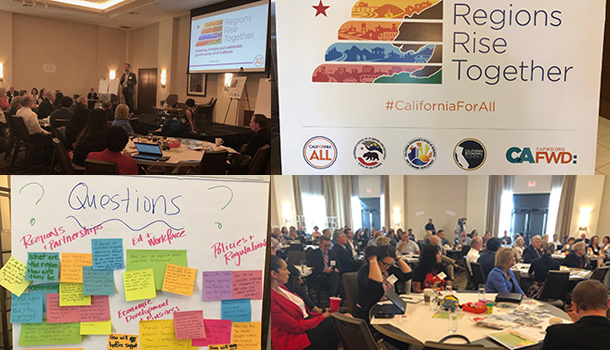
(Photo: CA Fwd)
The final Regions Rise Together meeting this year was held in Redding this week, as leaders from across the northern half of the state convened to talk about the future of region’s economy.
Regions Rise Together is an effort by the Governor’s Office, California Forward and a number of local and regional leaders to ultimately achieve inclusive and sustainable economic growth across all of California.
The issues of the northern region revolve around the future of the forest, having enough housing, access to broadband and the internet, the burgeoning ag tech sector, the climate economy, and resiliency.
“For the last several weeks we have traveled across the state and in every place, when you get to the region’s core, there is something very distinct and special about each place — always tied to their history,” said Lenny Mendonca, the chief economic and business advisor to Governor Gavin Newsom and director of the Governor’s Office of Business and Economic Development (GO-Biz). “In Redding we saw that forest health resiliency can be both an innovation and economic development opportunity, if done strategically.”
The conversation is part of a process which will identify and inform recommendations to support inland California and will be a main topic for Governor Newsom’s keynote address at the California Economic Summit which takes place in Fresno on November 7-8.
Rachel Hatch is the program officer for community vitality for The McConnell Foundation and she saw the conversation as important for all sectors of the economy—including hers.
“It was a very good discussion about not only the role that government and business play in strengthening our region, but also how philanthropy can work closer together,” Hatch said. “The need to continue to strengthen our social infrastructure is a constant.”
This area has, of course, been especially hard hit by the fires which have severely (and negatively) impacted the area. But the resiliency shown in the region has also served as a reminder that Californians, when they put their mind to something, can change things for the better.
“It was thrilling to see the transformation going on in northern California,” said Micah Weinberg, CA Fwd CEO. “The collective energy to confront regional challenges while planning for a more diverse and vibrant economy bodes well for the future.”
As the group began to review what can happen, both the opportunities and the challenges to building triple bottom line economic development that creates sustainable good paying jobs emerged.
As an example, there is great support to accelerate the biomass industry that can take forest waste and develop product that not only can employ people but also will result in a better maintained forest. As one attendee said, “we should put biomass on an equal playing field with wind and solar to make it more relevant and available for grant funding.”
At the same time comes the complication that much of the land is owned by the federal government—and that many point out is not well maintained nor does the government pay taxes on it.
Mendonca pointed that the forest products industry is an important one and the state wants that industry to be sustainable.
Like many parts of inland California, access to the internet is a big issue. Business people and their customers, educators and their students, health care professionals and their patients are all adversely affected when there is no immediate and easy access to broadband.
A recurring theme in these meetings, which have also been held in San Bernardino, Bakersfield and Merced, is getting more regional representation on state boards and commissions to make sure that they are heard when state policy that might impact the regions is developed.
In addition to state government and California Forward, the well-attended meeting came together thanks to the hard work of regional partners including the McConnell Foundation. Northern California Water Association, Redwood Coast Rural Action, Rural County Representatives of California, Shasta College, Shasta Regional Community Foundation and the Sierra Business Council.

